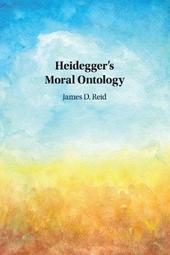
|
Heidegger's Moral Ontology
Paperback / softback
Main Details
| Title |
Heidegger's Moral Ontology
|
| Authors and Contributors |
By (author) James D. Reid
|
| Physical Properties |
| Format:Paperback / softback | | Pages:249 | | Dimensions(mm): Height 230,Width 153 |
|
| Category/Genre | Western philosophy from c 1900 to now
Ethics and moral philosophy |
|---|
| ISBN/Barcode |
9781108434713
|
| Classifications | Dewey:171.2 |
|---|
| Audience | | Professional & Vocational | |
|---|
| Illustrations |
Worked examples or Exercises
|
|
Publishing Details |
| Publisher |
Cambridge University Press
|
| Imprint |
Cambridge University Press
|
| Publication Date |
17 September 2020 |
| Publication Country |
United Kingdom
|
Description
Heidegger's Moral Ontology offers the first comprehensive account of the ethical issues that underwrite Heidegger's efforts to develop a novel account of human existence. Drawing from a wide array of source materials from the period leading up to the publication of Being and Time (1919-1927), and in conversation with ancient, modern, and contemporary contributions to moral philosophy, James D. Reid brings Heidegger's early philosophy into fruitful dialogue with the history of ethics, and sheds fresh light on such familiar topics as Heidegger's critique of Husserl, his engagement with Aristotle, his account of mortality, the role played by Kant in the genesis of Being and Time, and Heidegger's early reflections on philosophical language and concepts. This lively book will appeal to all who are interested in Heidegger's early phenomenology and in his thought more generally, as well as to those interested in the nature, scope, and foundations of ethical life.
Author Biography
James D. Reid is Associate Professor of Philosophy at the Metropolitan State University of Denver. He has co-edited Thoreau's Importance for Philosophy (2012) and is the author of Being Here Is Glorious: On Rilke, Poetry, and Philosophy (2015).
Reviews'Drawing on a broad range of literary and philosophical sources, Reid perceptively, sensitively and rigorously explores the case for a 'moral ontology' grounded in Heidegger's early works: this is essential reading for anyone interested in modern European philosophy, and in the problems and possibilities embedded in Heidegger's thought.' Sacha Golob, King's College London
|